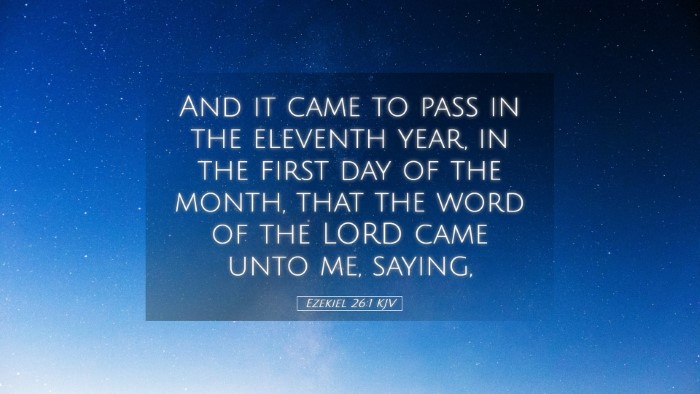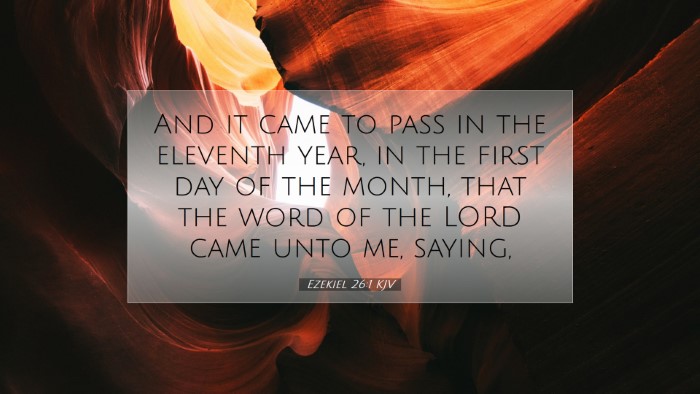Commentary on Ezekiel 26:1
Ezekiel 26:1 states: “And it came to pass in the eleventh year, in the first day of the month, that the word of the Lord came unto me, saying,” This verse serves as a critical introduction to a prophecy concerning the city of Tyre.
Contextual Background
The prophecy is set in the backdrop of the political and social upheaval surrounding Jerusalem's fall. In this period, Tyre had become a significant player on the world stage, both in terms of commerce and politics. Ezekiel’s message regarding Tyre serves a dual purpose: to pronounce judgment and to highlight God’s sovereignty over the nations.
Significance of Time Reference
The specific mention of time (“in the eleventh year, in the first day of the month”) is not without purpose. Matthew Henry emphasizes that the precision of time is meant to indicate that God’s messages are timely and pertinent to the historical context. The first day of the month is regarded as a notable time; it marks the beginning of cycles, suggesting significant shifts in God's dealings with nations.
Judgment Against Tyre
In the following verses, Ezekiel details the impending judgment on Tyre. As Albert Barnes notes, Tyre had a reputation for its wealth, pride, and idolatrous practices. The Lord’s declaration through Ezekiel is a warning of the collapse of this proud city. The pride and arrogance associated with Tyre is underscored throughout biblical literature, as it is seen as standing against God and His people.
Symbolism of Tyre
Tyre serves as a symbol of worldly pride and self-sufficiency. Adam Clarke points out that the city’s geographical advantages and mercantile strength contributed to a facade of invincibility. However, the impending judgment illustrates that no matter how fortified a city may seem, it cannot withstand the plans and purposes of God.
Theological Implications
This prophecy speaks to the sovereignty of God over all nations and serves as a reminder to believers of God’s ultimate control in history. No power can rival that which God displays through His prophetic declarations. Clarke further elaborates that this judgment is both a warning and a call for repentance — not only to Tyre but also to surrounding nations who share in their liabilities.
Lessons for the Contemporary Church
- God's Sovereignty: The narrative reinforces the conviction that God is sovereign over human affairs. In tumultuous times, believers find solace in knowing that God is in control, orchestrating events according to His divine will.
- Warning Against Pride: The downfall of Tyre serves as a cautionary tale against pride. The church today must remain humble and rely not on worldly systems but on God’s grace.
- Importance of Prophecy: This passage invites deeper exploration into the prophetic nature of Scripture. It encourages today’s scholars and theologians to study both the consequences of disobedience and the hope of restoration.
Conclusion
In summary, Ezekiel 26:1 is not merely a historical reference but a profound statement about God’s righteousness, a proclamation against arrogance, and a reminder of the certainties of divine judgment. As pastors, students, and scholars dive deeper into the text, they find an encouraging and sobering balance between God’s justice and mercy, underscoring the relevance of Scripture in today’s world.


